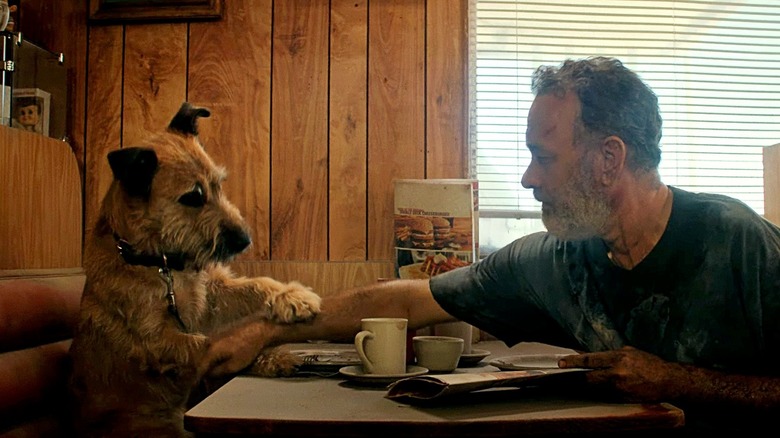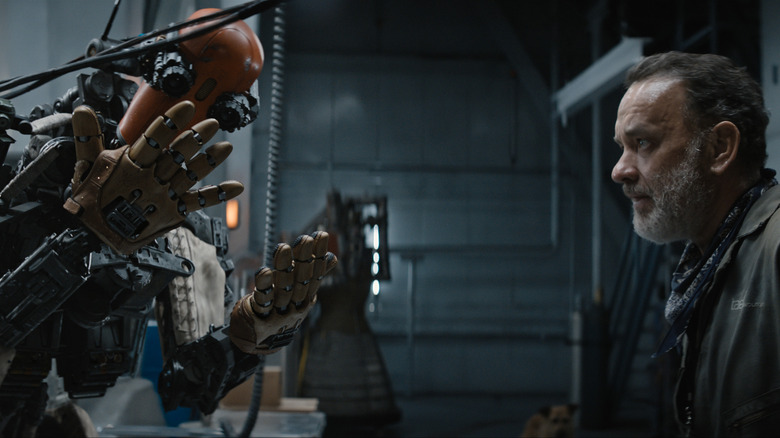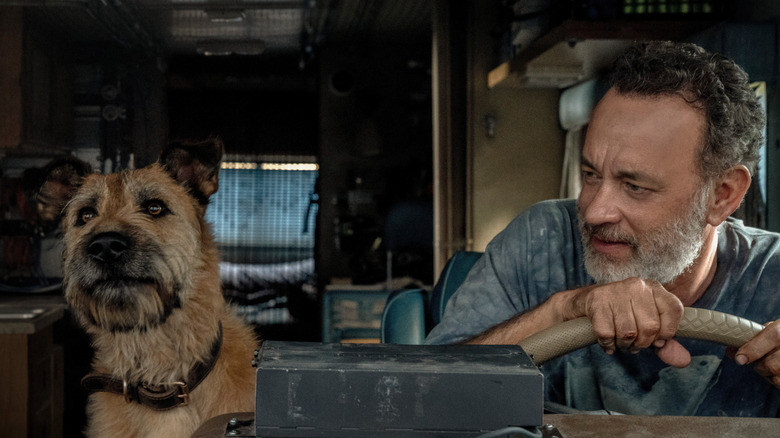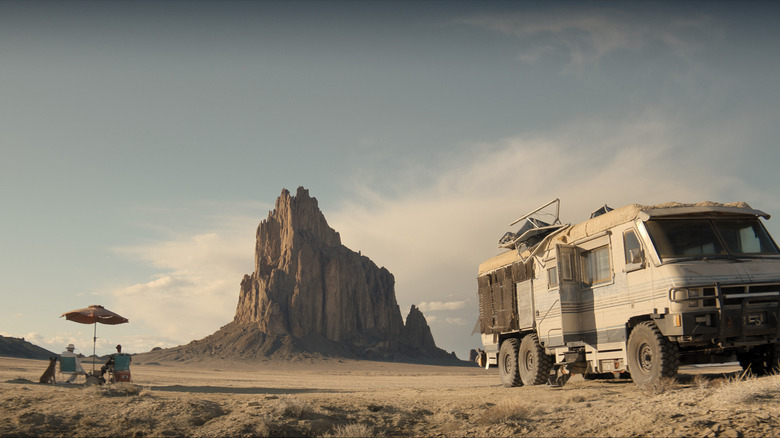Finch Review: Tom Hanks Travels The Post-Apocalyptic Wasteland With A Very Good Dog And A Very Good Robot
"Where must we go, we who wander this wasteland, in search of our better selves." That quote appears on the screen at the end of "Mad Max: Fury Road," attributed to the (fictional) book "The First History of Man." And while "Finch," the new Apple TV+ movie starring Tom Hanks, has none of the jaw-dropping stunts or pulse-pounding action of "Fury Road," that quote would be perfectly at home within the confines of this story, too.
"Finch" is an unconventional post-apocalyptic flick, one where the doom and gloom exist more on the margins. That's not to say this is some candy-coated, ultra-positive look at the end of the world. There's an undeniable melancholy here; a tragic loneliness that can't be shaken off. But there's also an element of acceptance. Acceptance that what happened happened, and sometimes there's no way to undo that. There will be no solution to the end of the world here, but there is a glimmer of hope. Hope that we might still find our better selves. And hope that a piece of us can still go on long after we've returned to the dust.
"Finch" feels slightly cobbled together from other, similar pieces of entertainment. It's impossible to look at the empty, dust-choked wasteland here and not recall "WALL-E." The road trip element that sets in after the intro reminds one of the more recent "Nomadland." And, what with this being an Amblin production and all, there are also Spielbergian tropes on display, with moments that immediately remind us of "E.T.", "A.I.", and more. Indeed, watching "Finch," I couldn't help but think that the film would probably be even better had Spielberg himself helmed it. It feels perfectly in line with his sensibilities — there's even a bit late in the film about an absentee father.
But this is not Spielberg's work. Instead, "Finch" is in the hands of Miguel Sapochnik, who helms the film with a light touch, working from a script by Craig Luck and Ivor Powell. No one will ever confuse Sapochnik with Spielberg, but the director does more than hold his own, blending an unexpected sweetness with a harsh, violent reality that threatens to tear everything apart. "Finch" is often a kind, charming, even heart-warming movie. It's also a movie where desiccated corpses lay sprawled about, and danger lurks in the darkness.
Don't Take Tom Hanks For Granted
Have we begun to take Tom Hanks for granted? There was a time when a new Hanks film was treated as some sort of event, but in recent years it's begun to feel as if we've all just accepted that Hanks is good at what he does, and moved on. To be fair, at this point it really seems like Hanks has nothing more to prove — he's a multiple Oscar winner and a beloved famous person. Yet time and time again, the actor will turn in a great performance that's met with little more than a polite nod.
Last year's "News of the World" may not have been a great movie, but Hanks' work therein was as good as it's ever been. And yet ... no one seemed to take much notice. Hell, one of the best performances of his career, his lead role in "Captain Phillips" in 2013, didn't even score him an Oscar nom. And watching Hanks in "Finch," where he plays a dying man in a dying world, I found myself a tad emotionally wrought, thinking that one day the actor will be gone, and all that will be left for us is his stellar work. We shouldn't overlook it, and we should cherish it while we can.
All that is a long-winded way of saying Hanks is predictably great here. Very few modern actors could carry a movie like this — a movie where Hanks' co-stars are a robot and a dog. But Hanks wrings pathos from every scene. His inherent everyman charm makes his character, a scientist named Finch, almost immediately likable. Finch lives in a ruined world; holes in the ozone layer have killed off huge swaths of the population and made the world itself largely uninhabitable. When Finch does venture out for supplies, he puts on a cobbled-together protective suit and travels around in a fortified RV.
Home for Finch is a secluded laboratory that he shares with a dog and a cute little robot named Dewey (Dewey seems heavily inspired by WALL-E, right down to the sounds it makes). But Finch is hard at work at a bigger, more advanced robot — a humanoid figure that will probably remind some people of the abysmal "Chappie," for better or worse. The robot, voiced by Caleb Landry Jones, eventually names itself Jeff, and there's never a moment where we don't buy into Jeff as a character. He may not be a human, but he feels completely alive, helped by Jones' motion-capture performance. The digital work to bring Jeff to life is flawless; he feels tangible, and that is no small feat. Jeff has been created for a very specific reason: Finch, who has been poisoned by gamma radiation, knows his time on this planet is growing shorter by the day, and he needs someone to watch over his beloved dog, Goodyear.
A Man, A Dog, and a Bot
While Goodyear is given the occasional funny reaction shot, the dog is always presented as a dog. He doesn't talk, he's not anthropomorphized, he's just a dog. A very good dog, but a dog all the same. A clunkier movie might've made the dog more of a character, but "Finch" wisely forgoes this, realizing that most people can immediately relate to a dog who is just a dog. The bond between Finch and Goodyear is sweet and simple, but it's not exactly love at first sight between Goodyear and Jeff the robot. Jeff is still learning as he goes along, and while he tries to connect with Goodyear, the dog is having none of it. This is a bit of a problem since Jeff is meant to be Goodyear's new companion after Finch is gone, but there's no problem a road trip can't solve, right?
Soon, Finch, Jeff, and Goodyear are hitting the road in the RV, heading towards San Francisco. Finch grows sicker along the way, and there's some doubt as to whether or not he'll even make it to the end of the trip. First, though, he'll have to teach Jeff some valuable lessons about life, and how to survive and protect Goodyear. Jeff, being a newborn and all, isn't instantly adept at his new tasks, which also helps make the character relatable. If this were a perfect machine we'd have less to connect with. By making Jeff a bit of a walking disaster, "Finch" endears him to us.
The road trip element keeps the narrative moving, although when all is said and done, I was slightly taken aback at how small "Finch" feels. But perhaps that's part of the movie's strength. Yes, this is a post-apocalyptic world, but we never meet any other human survivors beyond Finch. A few are glimpsed here and there, but we only see bits of pieces of them from a distance. Later, when Finch and the gang encounter a potential human threat, the menacing character is never once shown on screen — we simply see their dark car following the RV. This shrinks the world of "Finch" down while crafting something oddly intimate. These characters are our only point of reference for this damaged world, and we can either cling onto them or toss them aside.
On the Road
Hanks carries the entire film on his back, and this is yet another great bit of work from the actor. I fear it's also yet another performance that will be overlooked since "Finch" is destined for Apple TV+ and not the big screen or a more popular streaming service. But the humanity that Hanks radiates is essential to making "Finch" work, and work well. When Finch has a heart-to-heart moment with Jeff in the landscape of Death Valley, it's heartbreaking, primarily because Hanks downplays his dialogue. He's giving a BIG SPEECH, in all caps, but it never feels that way. We are blessed to have Hanks as an actor who still seems like he has great work ahead of him.
That Death Valley segment comes late in the film, but it's this sequence that makes "Finch" truly memorable. There are moments here where we see Jeff, alone against the landscape, that are nothing short of stunning. To see this robotic, synthetic creation – all clanking, rough-hewn metal, and hydraulic wires — contrasted against the dry, natural beauty of the desert as the sun goes down like a ball of fire casting beautiful shadows is something special.
The elements play a big part throughout the film, and they're presented as both destructive and nurturing. There's dust that whips at breakneck speed; disastrous storms that can rip structures apart; bursts of angry lightning. And then there's that fading sunlight in the desert. And the road that continues on, taking our characters further on their journey. A road that opens up, and sprawls, and seemingly never ends. There's hope out there. Somewhere.
/Film Review: 7.5 out of 10



